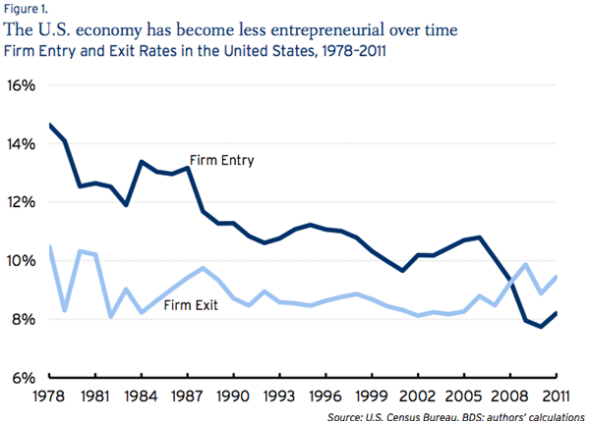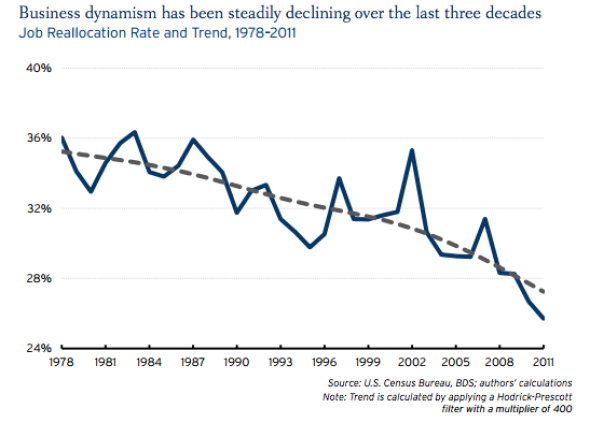This story originally appeared on Inc.
Ever feel that being an entrepreneur is like having a membership at a big club? Heads up: The roster is getting smaller. According to a new Brookings Institution study, entrepreneurship has reached at least a three-decade low across virtually all of the country.
The paper doesn’t pretend to understand why this trend has occurred—and beware of any impulse you may have to say, “Of course!” However, there are clear implications for those trying to run their own businesses. Some are good in the short term; many are bad in the long. It does mean that entrepreneurs have to look at a shifting landscape that could change the way they create and grow companies.
By the Numbers
Rather than try to measure psychological attitudes towards entrepreneurship, researchers Ian Hathaway and Robert Litan (the latter formerly a vice president of research and policy at the Ewing Marion Kauffman Foundation, which studies and fosters entrepreneurship) looked at some hard numbers.
One set was the difference between the rate at which new businesses were started and closed, based on U.S. Census data. The graph below shows the pattern:

Business entries mean companies that were less than a year old, expressed as a percentage of total businesses. Exits are the percentage of firms that went out of business for whatever reason.
For decades, the entrance of firms outpaced their exit, meaning a net increase in new businesses. The authors see that–reasonably, it seems–as a proxy to an inclination toward entrepreneurism. But since at least 1978, the lines have converged, albeit slowly. In 2008, they reached a watershed moment and crossed.
The math is simple: More firms leaving than arriving means a shrinking percentage of business is being controlled by entrepreneurs. And notice that the exits were relatively steady. It was the creation of new firms that has sagged.
The second set of data supports a conclusion that entrepreneurship faces a major challenge. Job reallocation—“a broad measure of labor market churning resulting from the underlying business dynamism of firm expansions, contractions, births, and closures”–has also been declining for decades. As people increasingly stay put, fewer are moving to other employment, including new ventures.

You might explain the second figure as a result of a tighter job market, a more conservative approach by employees, or general concern about the future. But put them together and you have a picture of people shying away from risk and not betting their future on a new business.
This also isn’t an issue of a slump in some parts of the country. According to the report, the results are fairly even across every state and nearly all of the 366 metropolitan areas examined.
The Bottom Line
The implications for entrepreneurs are generally sobering:
- The authors conclude that there is a general atmosphere of consolidation in which older, larger businesses are doing increasingly better than new ones.
- An additional observation you could make is that as things contract, the general support network that had been available to entrepreneurs is likely doing the same. That includes the availability of mentors, partners, and investors.
- With lowering levels of entrepreneurship in the country, chances are that other countries could provide greater competition, often at lower labor rates, creating increased pressure on U.S. entrepreneurs.
According to the authors, the country needs to consider strong actions, because of the importance of new firms and entrepreneurs in the economy. They suggest allowing more foreign entrepreneurs to receive permanent work visas, letting foreign students in STEM fields to remain and work (particularly as they are twice as likely as native-born Americans to start businesses), and have state and local organizations and governments try new ways to encourage entrepreneurship.
Welcome to the future, ladies and gentlemen.
See Also: Why Office Gossip Is Great
